- Home »
- City Tours »
- Suzhou Tours »
- SZ-02
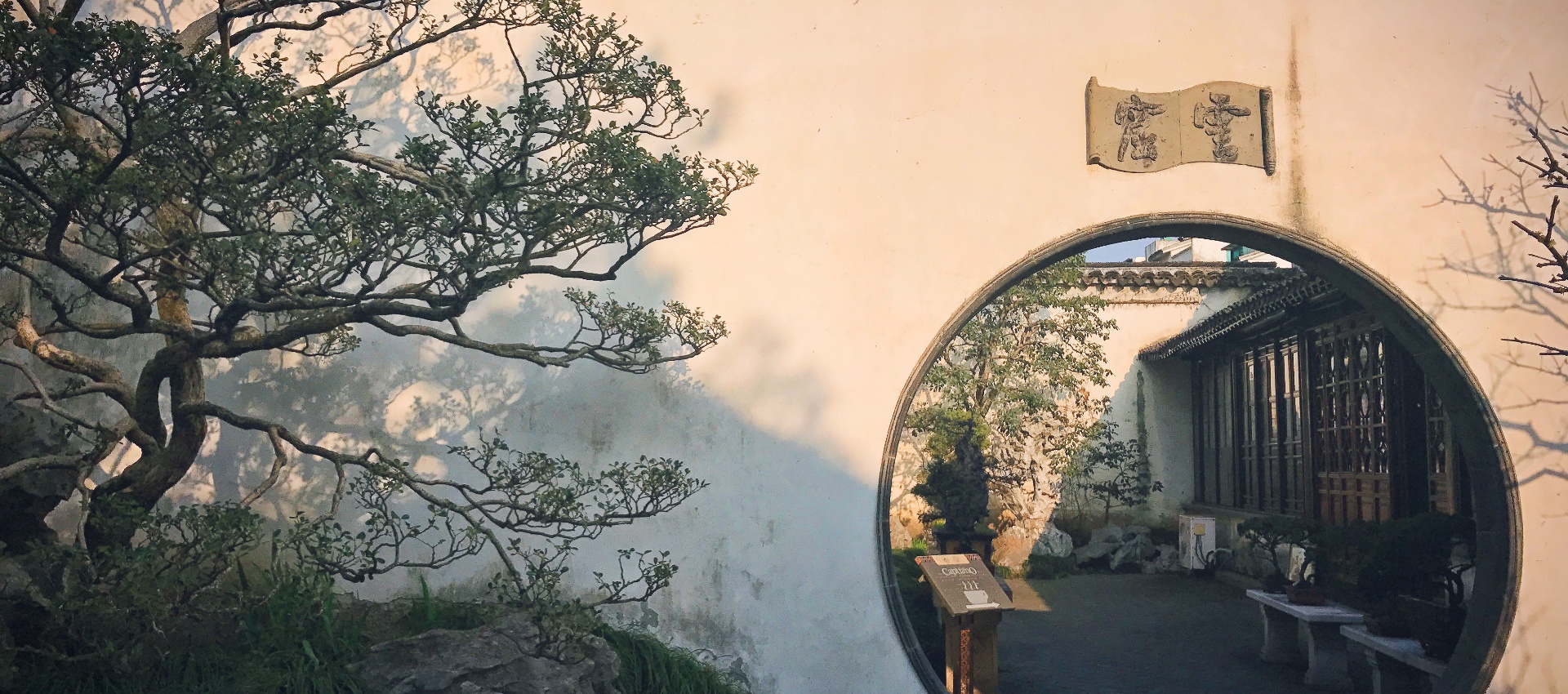
Suzhou Educational Tour
Itinerary at a Glance
| Day | Location | Highlights |
|---|---|---|
| D1 | Suzhou | Arrive in Suzhou; transfer to hotel & check in |
| D2 | Suzhou | Visit Humble Administrator's Garden, Suzhou Museum explore Suzhou culture, Lacquer fan making, Pingjiang Road visit |
| D3 | Suzhou | Tongli Ancient Town boat tour, Tiger Hill visit, Su-style bonsai making |
| D4 | Suzhou | Garden model building, Lion Grove Garden, Jinji Lake, Master-of-Nets Garden night tour |
| D5 | Suzhou | check out of hotel; transfer to the airport/station; tour ends |
Trip Highlights
- Visit the Humble Administrator's Garden to experience the architectural wisdom of Suzhou gardens that adapt to local conditions
- Go to the Suzhou Museum to learn about the development of Suzhou's regional culture
- Take a boat tour in Tongli Ancient Town to appreciate the characteristics of Jiangnan water towns
- Build a garden model to learn garden-making techniques
Tour Essentials

Quality
No Shopping Traps

Group Type
Private

Tour Focus
Suzhou Gardens & Water Towns

Accommodation
Nights:4
Best Season
Spring, Summer, Autumn, Winter
Full itinerary for Suzhou Educational Tour
Upon your arrival in Suzhou, a driver will greet you and transport you to the hotel. After checking in, you can choose to rest or take a walk around the hotel to get your first impression of Suzhou.
After enjoying breakfast at the hotel on the early morning of the second day, you will depart for the Humble Administrator's Garden. As one of China's Four Great Gardens, it is a typical representative of Jiangnan gardens. Every step in the garden reveals a new scene, allowing you to immerse yourself in the aesthetics of Chinese gardens. Most of the buildings here adopt the Su-style architectural style, with a greater emphasis on returning to nature and pursuing classical beauty. Here, you can appreciate the unique architectural aesthetics of Jiangnan and the architectural wisdom of the Humble Administrator's Garden that adapts to local conditions.
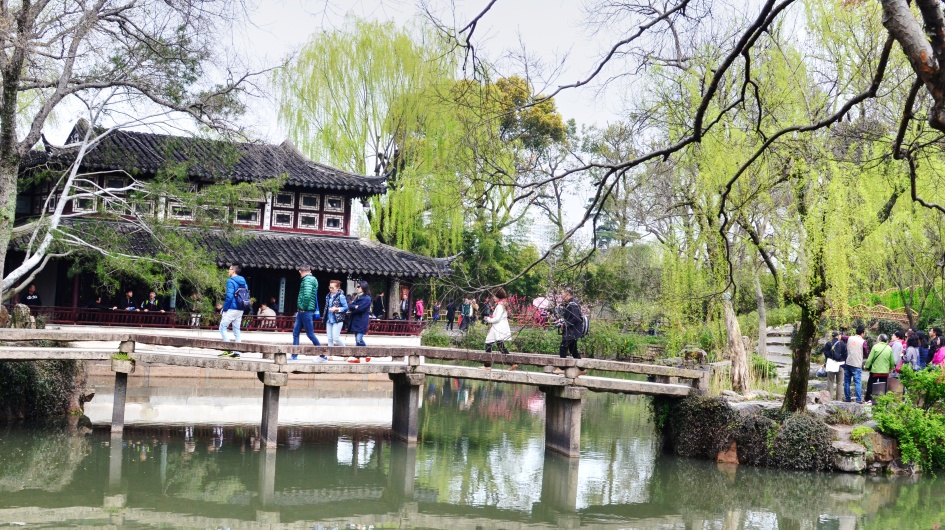 Visit the Humble Administrator's Garden to learn about the architectural features of Suzhou gardens
Visit the Humble Administrator's Garden to learn about the architectural features of Suzhou gardens
After leaving the Humble Administrator's Garden, you will head to the Suzhou Museum. It is a comprehensive museum that integrates modern museum buildings, ancient architecture and innovative landscape gardens. By admiring the museum building itself and the exhibits inside, you will learn about the traditional Jiangnan architectural design concepts and the development of Suzhou's regional culture from the Pre-Qin Dynasty to the Ming and Qing Dynasties.
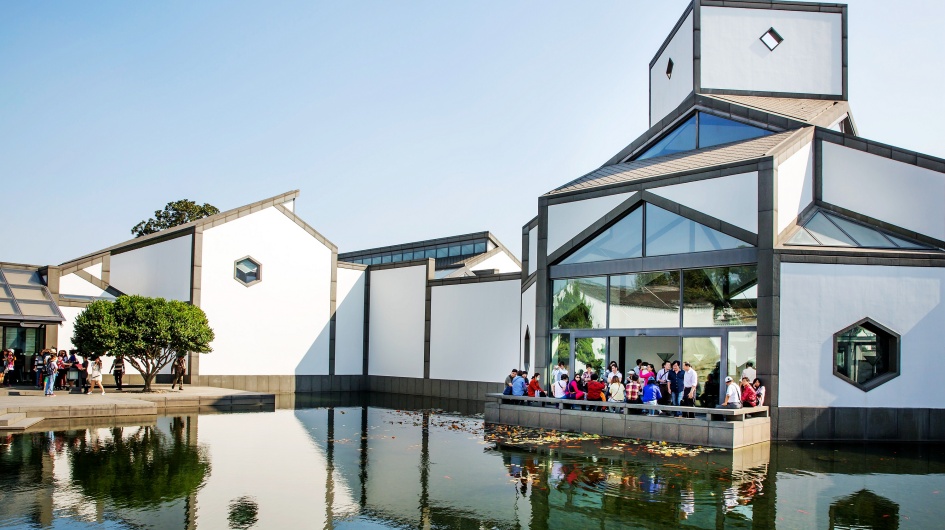 Exploring Suzhou Culture in Suzhou Museum
Exploring Suzhou Culture in Suzhou Museum
In the afternoon, you will participate in a lacquer fan making experience. Under the guidance of professional teachers, you will personally take part in the entire process of lacquer fan making and complete a unique lacquer fan of your own. During the process, you will learn about the history of lacquer fans and traditional craftsmanship skills, and experience the cultural value of intangible cultural heritage. Finally, you will visit Pingjiang Road, a historical block in Suzhou. It is built along the river, with water town-style buildings scattered along the banks. You can taste Suzhou's characteristic food here, experience the regional features, and take a walk to observe the spatial layout of Jiangnan water towns.
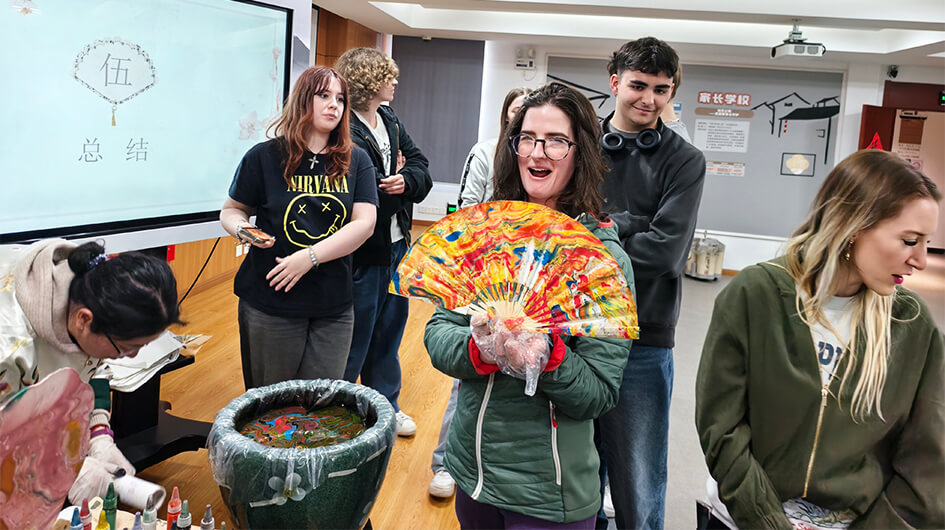 Students Making Lacquer Fans
Students Making Lacquer Fans
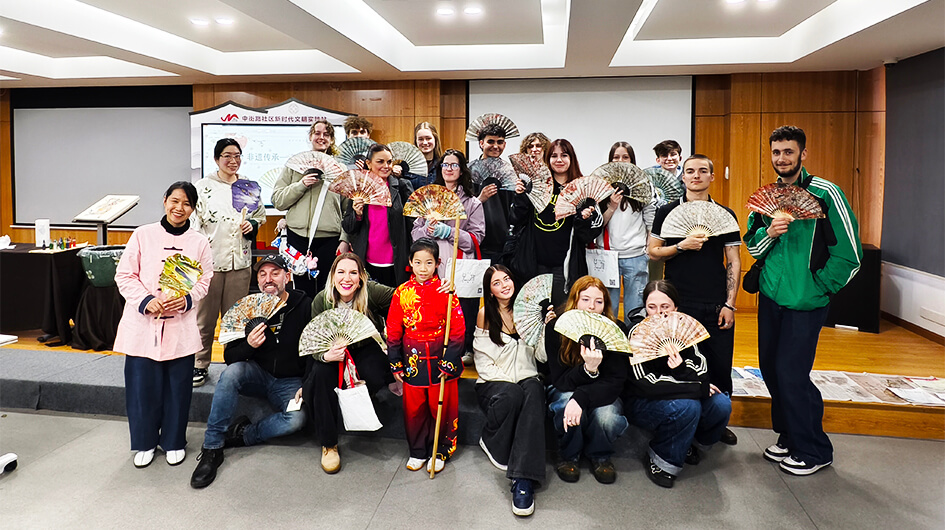 Students and Their Unique Lacquer Fan Works
Students and Their Unique Lacquer Fan Works
Your Journey’s Rewards:
By visiting the Humble Administrator's Garden and Suzhou Museum, you will gain an in-depth understanding of the aesthetics of Suzhou classical gardens and modern architectural innovation. During the lacquer fan making process, you will learn about the history of lacquer fans and traditional craftsmanship skills, and experience the cultural value of intangible cultural heritage. Wandering along Pingjiang Road allows you to gain a practical understanding of the spatial layout of Jiangnan water towns.
Educational Focus:
What are the architectural characteristics of Suzhou classical gardens?
Takeaway:
Suzhou gardens do not pursue simple replication and symmetry, but rather the charm of nature and unique beauty. This design concept is precisely in line with the essence of aesthetics, which is to pursue natural and unrestrained beauty. The integration of residence and garden is a major feature of Suzhou classical gardens. This architectural form allows people to enjoy urban materials while integrating with nature. Skilled craftsmen use various garden-making techniques to naturally integrate buildings such as pavilions, terraces, attics with pools, streams, flowers, trees and rocks.
Thought Challenge:
In the protection of Suzhou classical gardens, how to balance the need to "maintain the original historical style of the gardens" and "meet the visiting experience of modern tourists"?
In the morning, you will depart and arrive at Tongli Ancient Town. Founded in the Song Dynasty, the ancient town has a history of nearly a thousand years and is famous for its "small bridges, flowing water and houses". There are 49 existing ancient bridges and architectural complexes from the Song, Yuan, Ming and Qing Dynasties. In the ancient town, you can feel the strong historical atmosphere and appreciate the beauty of Jiangnan water towns. Then you will go to the pier to experience a boat tour, enjoying the scenery on both sides of the river by boat, feeling the ecological wisdom of Tongli Ancient Town and understanding the architectural wisdom of Jiangnan water towns.
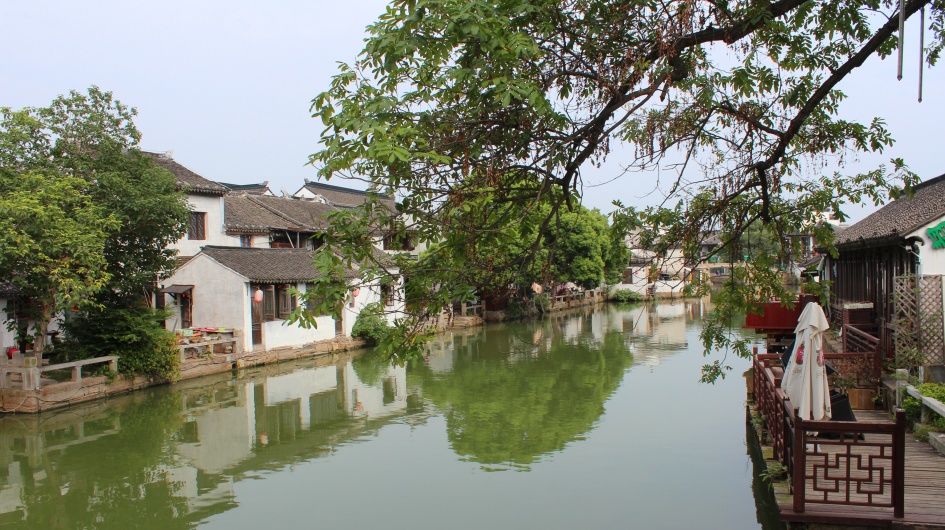 Appreciate the Water Town Characteristics of Tongli Ancient Town
Appreciate the Water Town Characteristics of Tongli Ancient Town
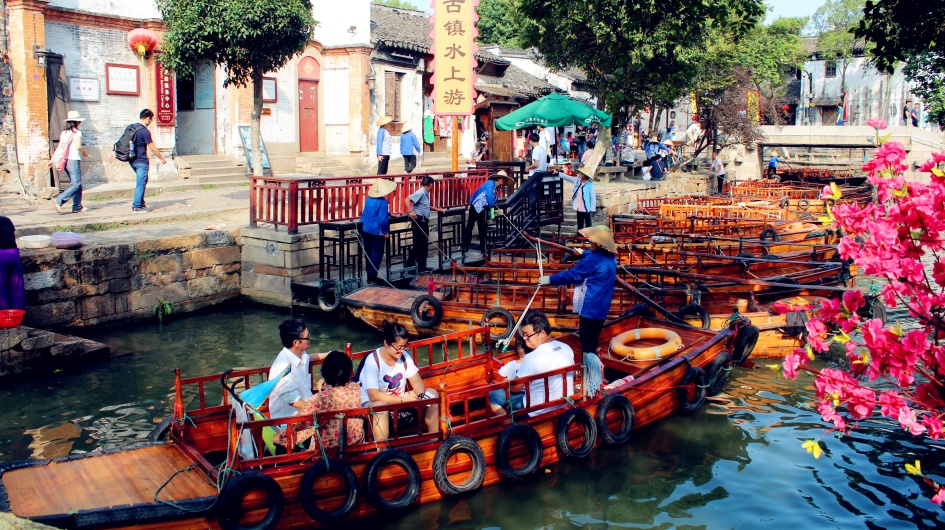 Students Taking Boat to Tour Tongli Water Town
Students Taking Boat to Tour Tongli Water Town
After lunch, you will head to Tiger Hill. Known for its natural and humanistic landscapes, Tiger Hill has presented architectural styles of different historical periods through construction over successive dynasties. First, you will visit the Tiger Hill Pagoda, known as "China's First Leaning Pagoda". You will analyze how the design of the Tiger Hill Pagoda enhances its stability and understand the earthquake-resistant wisdom behind its "standing firm for a thousand years". After that, you will start a bonsai making experience. Under the guidance of bonsai artists, you will complete the making of a Su-style bonsai, learn the steps of bonsai making, understand the aesthetic concepts of Su-style bonsai as well as its status and value in traditional horticulture, and improve your aesthetic taste at the same time.
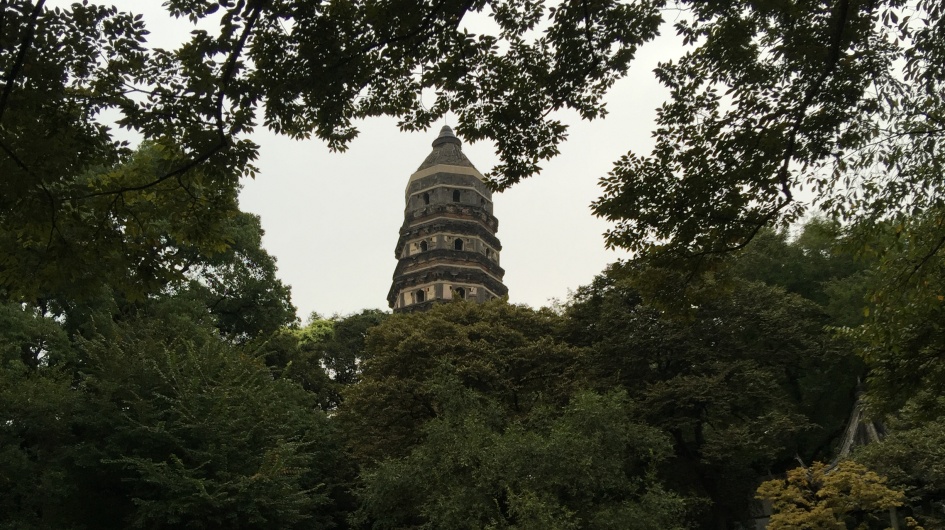 Tiger Hill
Tiger Hill
Your Journey’s Rewards:
By visiting Tongli Ancient Town and experiencing the Tongli boat tour, you will appreciate the style of Jiangnan water towns and feel their unique customs. By visiting Tiger Hill, you will feel and analyze the earthquake-resistant wisdom of the Tiger Hill Pagoda that has "stood firm for a thousand years". Under the guidance of bonsai artists, you will complete the making of a Su-style bonsai, learn the steps of bonsai making, understand the aesthetic concepts of Su-style bonsai as well as its status and value in traditional horticulture, and improve your aesthetic taste at the same time.
Educational Focus:
What are the characteristics of Tongli Ancient Town?
Takeaway:
Tongli Ancient Town is an ancient town with a long history and a typical water town style. It has won the reputation of "Little Venice of the East" due to its layout of "small bridges, flowing water and houses". Tongli has beautiful scenery and is surrounded by water on all sides outside the town. Its main characteristics are: numerous waters and bridges, many buildings from the Ming and Qing Dynasties, and many celebrities and scholars. Within the town, there are 38 gardens and residences from the Ming and Qing Dynasties, 47 temples, shrines and ancestral halls, as well as hundreds of houses of gentry and wealthy families and former residences of celebrities.
Thought Challenge:
In the tourism development of Tongli Ancient Town, how to meet the modern living needs of residents while preserving the traditional style of the water town?
After having breakfast in the morning, you will first start the garden model building experience. You will use the pre-prepared materials to complete the construction of the garden model based on the characteristics and spatial layout of Suzhou gardens. The production process will help you gain a deeper understanding of the architectural features of Suzhou gardens, and also contribute to cultivating your spatial imagination, gradually establishing spatial thinking and mastering spatial design capabilities. Later, you will visit Lion Grove Garden, which is famous for its exotic rocks and rockeries. Wandering in Lion Grove Garden, you can experience the layout wisdom of "coexistence of stone scenery and architecture".
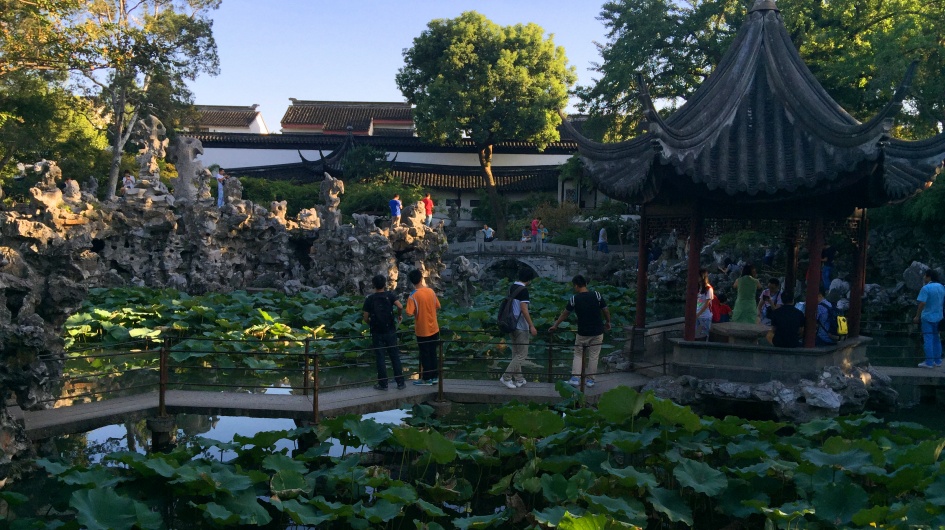 In-Depth Study of Suzhou Garden Layout at Lion Grove Garden
In-Depth Study of Suzhou Garden Layout at Lion Grove Garden
You will arrive at Jinji Lake Scenic Area, the largest urban lake park in Suzhou. Here, you will visit Suzhou's famous attractions: the Oriental Gate, the Musical Fountain, and Li Gong Causeway, a causeway with a history of over a hundred years. In the evening, you can go to Moonlight Wharf to enjoy the beautiful sunset, and at night, you can admire the dazzling night view of Suzhou with twinkling lights. It must be said that Jinji Lake Scenic Area is the best place to experience the urban characteristics of Suzhou.
At night, you will take a night tour of Master-of-Nets Garden, a typical representative of private gardens in the Jiangnan region. During the night tour of Master-of-Nets Garden, you can enjoy a variety of cultural performances, including the Kunqu Opera The Peony Pavilion, guqin (a traditional Chinese seven-stringed zither) performances, and Pingtan (a traditional storytelling and ballad-singing art form in Suzhou dialect) performances. Amidst these cultural performances, you can feel the high integration of traditional Chinese culture with the garden environment, and experience the unique features of operas such as Kunqu Opera and Pingtan. At the same time, this will deepen your understanding of the layout and gardening techniques of classical gardens.
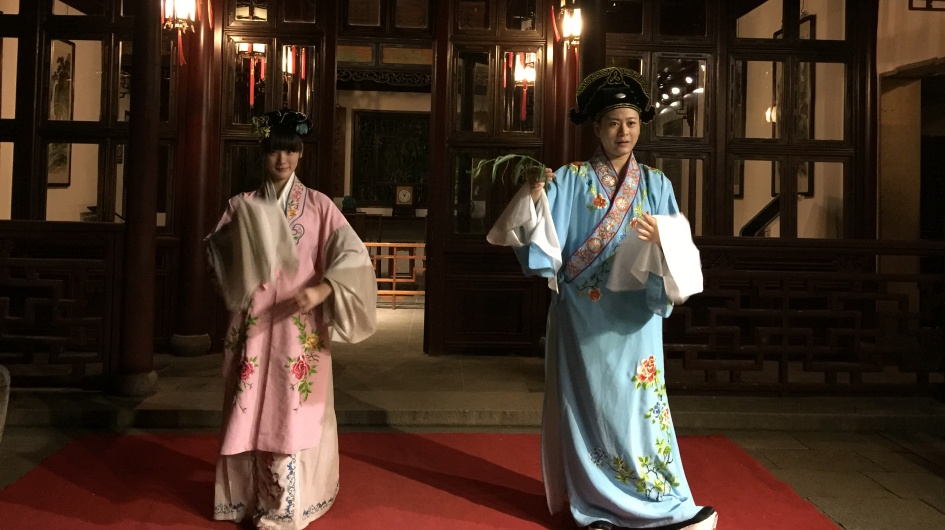 Listening to Kunqu Opera at Master-of-Nets Garden
Listening to Kunqu Opera at Master-of-Nets Garden
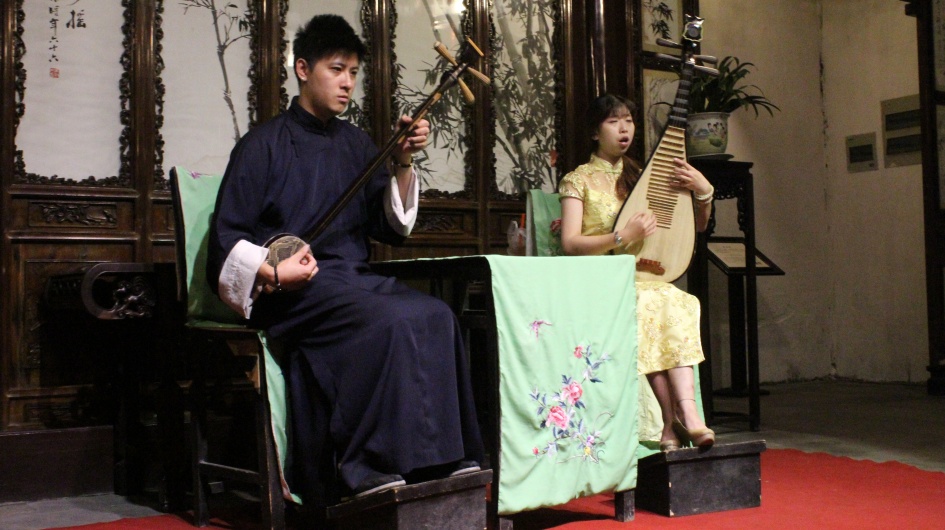 Guqin Art Appreciation
Guqin Art Appreciation
Your Journey’s Rewards:
By building a garden model, visiting Lion Grove Garden, and experiencing the night tour of Master-of-Nets Garden, you will gain a deeper understanding of the layout and gardening techniques of Suzhou classical gardens, and appreciate the architectural art characteristics of Suzhou gardens.
Educational Focus:
What are the layout characteristics of Master-of-Nets Garden?
Takeaway:
Master-of-Nets Garden is a typical example of the connected layout of family residences and gardens of noble families in ancient Suzhou, with residences in the east and the garden in the west, combined in an orderly manner. The overall layout of the garden is neat and balanced in appearance, while the interior is divided into different areas according to the scenery, each with a unique atmosphere. Generally, the garden centers around a pond and consists of five parts: the residential area in the east, the banquet and entertainment area in the south, the pond-surrounding area in the middle, the Dianchunyi (a small garden within the garden) in the west, and the study area in the north. It has a compact layout, exquisite architecture, and coordinated spatial scale proportions.
Thought Challenge:
The night tour of Master-of-Nets Garden needs to control the number of tourists and the tour rhythm to improve the experience, but commercial operations require expanding the reception scale. How to balance "cultural protection" and "commercial needs" to avoid the over-commercialization of Master-of-Nets Garden?
After breakfast, you can spend some time organizing your study notes and sorting out knowledge points such as the architectural features, garden layouts and gardening techniques of Suzhou classical gardens. Then you will check out of the hotel, and a driver will take you to the airport/station. Your trip ends here.
This tour is suitable for: School, Family, Team Building
What’s Included
- Experienced tour guides
- Entrance fee to all spots listed in the itinerary
- Well selected hotel accommodation
- Expert drivers and comfortable vehicles with air-conditioning
Hotel Options:
- Suzhou Hotel Accommodation: Grace Hotel
Wechat & WhatsApp: +86-13471279378